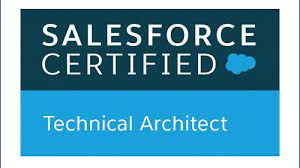Salesforce Technical Architects are highly sought-after professionals within the Salesforce ecosystem, leveraging their expertise to meticulously map the structure and functionality of Salesforce solutions. Their role ensures that the solution remains efficient, secure, cost-effective, and tailored to the specific needs of the business.
A Salesforce Architect
A Salesforce Architect plays a pivotal role in designing and implementing robust solutions for enterprise-grade customers utilizing Salesforce products. Their primary responsibility involves recommending optimal solutions based on specified requirements and articulating the trade-offs inherent in selecting one solution over another.
Becoming a Salesforce Architect is a combination of experience, deep knowledge of best practices, and to some extent, instinct. Attaining the Certified Technical Architect (CTA) certification is considered a challenging feat within the Salesforce ecosystem, demanding high levels of technical expertise, communication skills, and leadership capabilities to design and implement intricate solutions aligned with business requirements.
Certified Salesforce Technical Architect
As of recent data, there are approximately 300+ Salesforce Certified Technical Architects worldwide, making it an exclusive and esteemed certification. Technical Architects engage in hands-on execution during IT projects, focusing on a single implementation and specializing in specific domains while defining best practices.
The demand for technical architects is substantial, especially those adept at designing, implementing, and managing cloud architectures meeting business expectations. Knowledge of cloud platforms like AWS, Azure, Google Cloud, or Salesforce is essential for technical architects.
The Salesforce Architect career path is experiencing rapid growth, with a staggering 1,292% annual growth rate in the past five years. Successful architects are not only big-picture thinkers but also adept problem solvers. Generally possessing a broad and deep technical knowledge complemented by soft skills such as listening, communication, and presentation abilities.
Is This Person a Developer?
Contrary to common belief, becoming an architect doesn’t necessitate being a developer. However, architects should be able to read code, and recommend coding best practices. They should excel in the declarative (clicks not code) aspects of the platform. Integrating Salesforce with other technologies, governance, and development operations expertise are additional facets that architects bring to the table, blending technical prowess with business acumen for a collaborative and robust future.
A Salesforce Architect serves as a trusted advisor and leader, collaborating with business stakeholders to envision and architect solutions to business challenges. Generally acting as the technical team leader. They educate the team on technical best practices, translating business needs into a technical vision for low code or pro code builders. Architects also design organizational strategies and data models. They implement integrations, and provide solutions for large data volumes and data privacy considerations. Their role extends to identifying optimal solutions for business requirements and recommending the use of clicks, code, or a combination based on the business use case. With their extensive problem-solving skills, architects often serve as the final escalation point for production issues.
When you work with a Salesforce partner, like Tectonic, a Salesforce Technical Architect will be a part of your team.
If your core Salesforce team is missing a solid Salesforce Technical Architect, reach out to Tectonic today for assistance.













